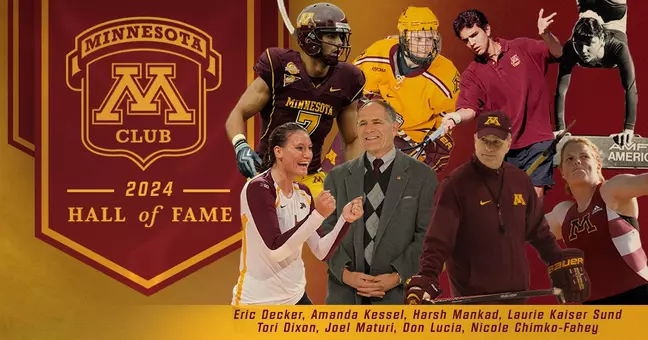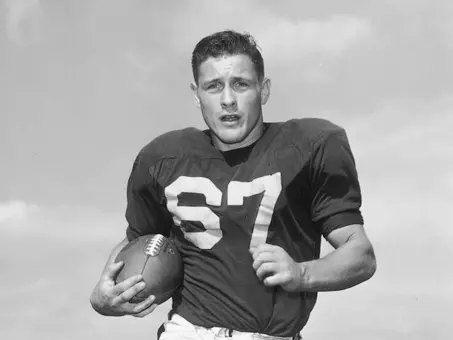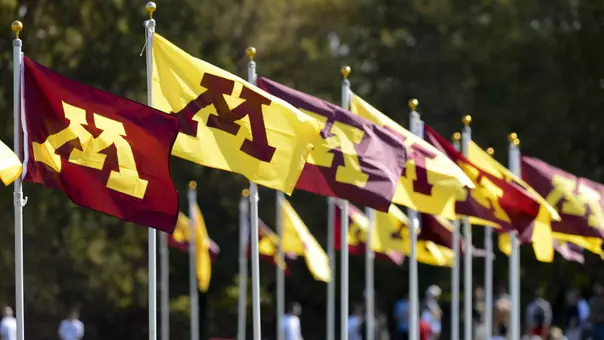University of Minnesota Athletics
Where Are They Now: Tom Rothstein
9/25/2015 12:00:00 AM | M Club
This feature was published in the September 2015 issue of Gopher Athletics' Ski-U-Mah magazine. To see this story as it appears in print (complete with fantastic photos) and to read the entire September issue of Ski-U-Mah click here.
Interview by Jake Ricker
When Tom Rothstein left competitive hockey in the mid-1980s, he didn't know exactly what he would do, but it seemed almost predestined that his path would lead him to starting his own business. Raising a family of 11 kids on Minnesota's Iron Range, Rothstein's father shepherded each of his children through college, largely thanks to starting and sustaining a pair of successful businesses. The lessons from his father were not lost on Rothstein.
Following a strong on-ice career at Minnesota that saw him average better than a point per game his junior and senior seasons and become the team's captain for the 1984-85 season, Rothstein has gone on to start several direct marketing firms in the Twin Cities. Today, along with former Gopher football player Jay Carroll, he owns and operates SeQuel Response, a rapidly growing direct marketing agency based out of Eden Prairie, Minn. that was one of the 20 fastest-growing, private companies in the Twin Cities in 2014.
Q: How did you end up playing hockey at Minnesota?
A: I'm from a large family in Grand Rapids [Minn.]. It was the heyday of the Halloween Machine of Grand Rapids hockey. It was an exciting time for me, being able to go to the state tournament three or four years in a row and then winning it my senior year. My older brother John played at UMD and my older brother Bill played at Notre Dame. I wanted to go out on my own and set my own mark, so rather than following either of my brothers it was nice to stay home and go to the U and put my own thumbprint on that.
Q: You certainly did that, especially in your last two seasons at the U. What do you recall from those season when you were a major contributor to the team's success?
A: Unless you're an incredibly elite player like a Kyle Rau or a Nick Bjugstad, there are just so many talented players in front of you [as a freshman]. By the time you get to your junior year or sometimes your senior year, that's where you really start to get your own ice time. It's a tough program to step in and be an impact guy [immediately]. It allows you time to become a leader, to watch the older leaders and what they do, so when your time comes you're ready for it.
Q: Speaking of leadership roles, you're a part of an elite fraternity of men's hockey captains. What did that mean to you then and what does it mean to you now when you look back on it?
A: At the time they announced me as captain at the banquet I was filled with a lot of pride and gratitude that the other players recognized Tommy as one of the leaders on the team. Today, as people introduce me, often they'll say, "This guy was the former captain of the Gopher hockey team." It brings back a lot of good memories. I certainly carry that with a lot of honor and I'm proud to say I'm part of the Gopher family. Today, I try to do what I can to make the University better, whether it's financially or whatever I can do to support all of Gopher Athletics.
Q: While you were playing hockey at the U, what were your plans for when hockey was over?
A: I grew up in a family where business and academics were very important. My dad owned two businesses, a finance company and a real estate company. My other brothers who played college hockey either graduated early or went on to get their master's in business. I wasn't the best student. I probably got too focused on hockey, but I always wanted to get into business. Coincidentally, three or four of my brothers own their own business like my dad. He set the tone for us early.
Q: Did he ever have any advice for you and your brothers about starting and owning a business?
A: On the practical side, he said, "It's always going to take twice as long and twice as much money as you figured, so you better bake that into the formula early." Growing up around him and [seeing] the values he had and the confidence he had, I think I'm just trying to mirror how he treated people extremely fairly and with high integrity. He instilled that in me and my siblings, and gave us the confidence that we could accomplish pretty much anything we set our minds to.
Q: How did you end up in the direct marketing business?
A: I didn't even know how to run a copy machine when I started in marketing. I was playing golf at Southview in St. Paul and a friend of mine that I had gone to the U with - he played football - was there playing with another member. He pulled up in a Mercedes and I was like, "Good God, what are you doing?" He said, "Well I'm in the direct marketing business." And I said, "Well you're dumber than I am, I think I should be in that business." They ended up convincing me to come work for them. That was my introduction to the business.
Q: How did you go from working for someone's direct marketing company to founding your own?
A: I had started a business in 1995 called Direct Marketing Group. They're still there today. [My current business partner] Jay came to work for me around 2005. He had a long history in the printing business. I knew him from the U. We both lived at Sanford Hall in 1980. We decided that we wanted to start more of an agency type of direct mail business. In 2010, we built an agency around the direct mail business that we felt would better serve the industry. My dad was right, it took a lot more money and a lot more time because the investment was so significant.
Q: What's your elevator pitch to describe what your company does?
A: A client will hire us - for instance, pick an insurance company - and they want to sell a certain insurance product. They'll hire us to build a program. We source data and build data models with our data and analytics team which identify who would be the best candidates to purchase that insurance product. We'll then create a creative package, produce those and mail them to get people to raise their hand and respond and ultimately purchase those products. At the end of the day, we're measured by the true acquisition cost to put that new customer on the books for our client. If we're really good at that and their acquisition cost is lower, then they come back and order more. It's really a sales company. We're using marketing tools to arrive at a statistical outcome - an acquisition cost that's affordable.
Q: Do you feel like being a student-athlete here at the U prepared you to succeed in the business world?
A: I think there's a great tie to it. They're very similar. We tagline as a performance-based company, so we are measured on how we do. I think that is very true of college athletics and athletics in general. You could say, "He's a pretty skater" or "He's got a nice shot," but, at the end of the day, he's going to make the team based on what he accomplished on the ice. That's true of business, too. You're only as good as your last shift or your last direct mail program. You better bring it every day or you won't be asked back.
Q: What did you take away from your experience at the University of Minnesota that you feel has helped you succeed later in life at the level you have?
A: There are just so many things that come to mind. I look at the U today and how it's come so far in regard to how it's perceived as an academic institution. I was really fortunate to go there. Going from a small town of 7,000 people to an academic college of 50,000 students, it was an eye-opening experience. I had to find my own way, but the resources, the education, the people, the institution - I wouldn't trade it for anything.
Q: Normally that would be a good last question but it has to be asked - do you have any good stories about former teammate and current Associate Head Coach Mike Guentzel?
A: He was pretty good. You know, I hate to say it, but he was the model student-athlete. You can see why he ended up being a coach. I took my liberties to have a little fun along the way. He did things the right way all the time.




